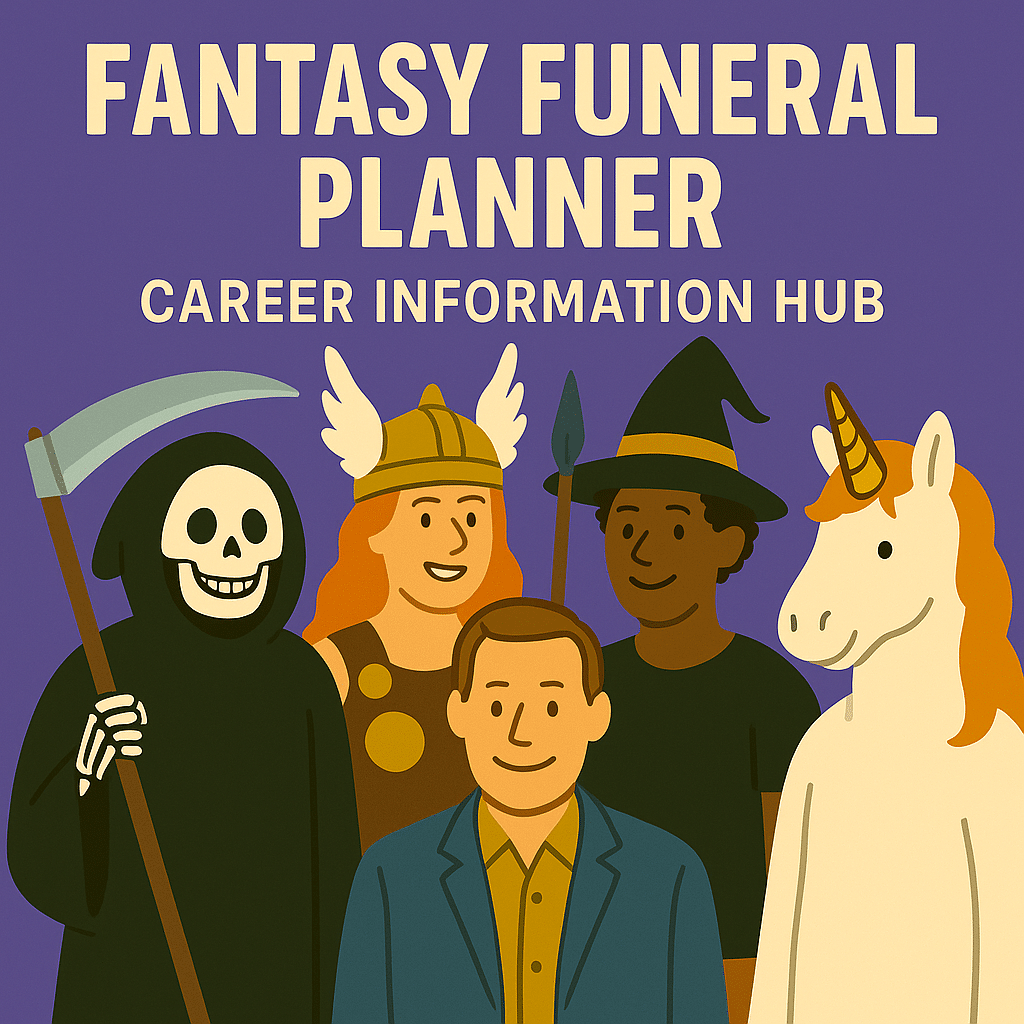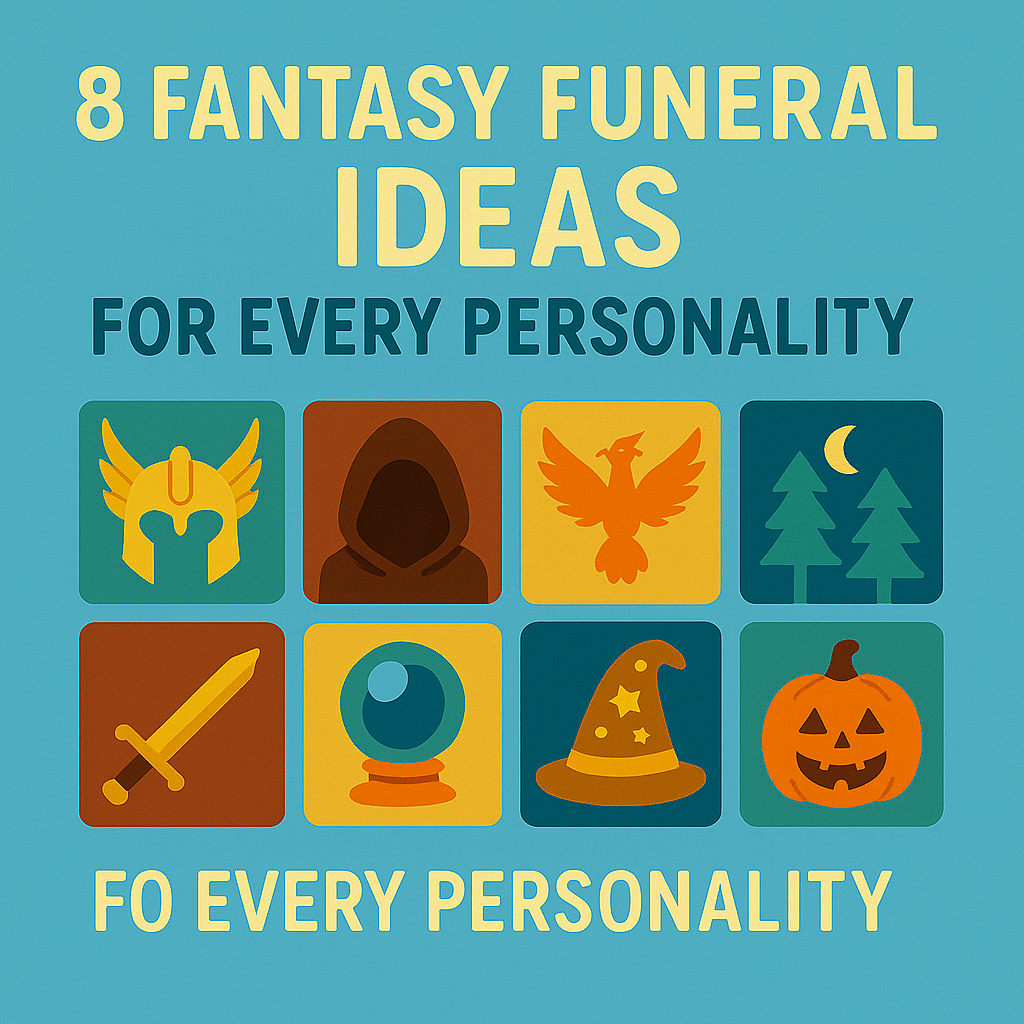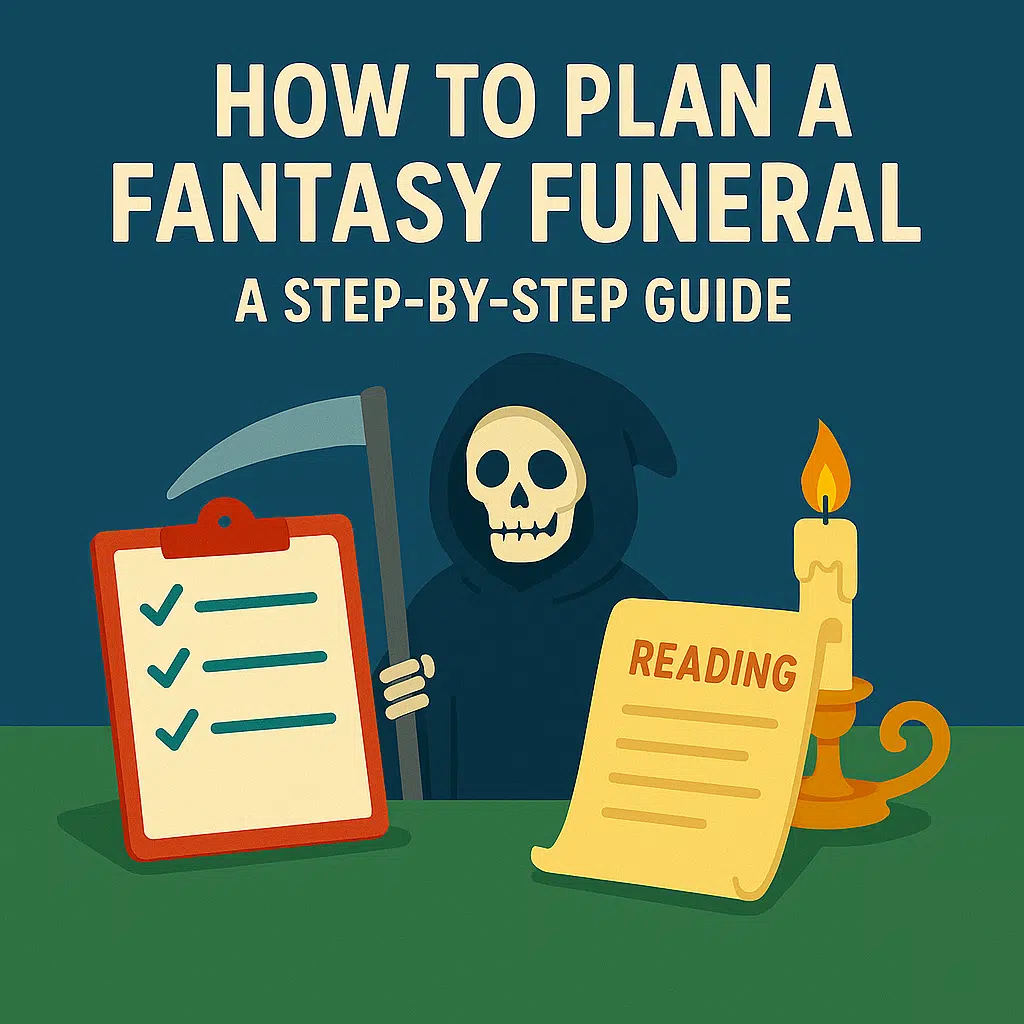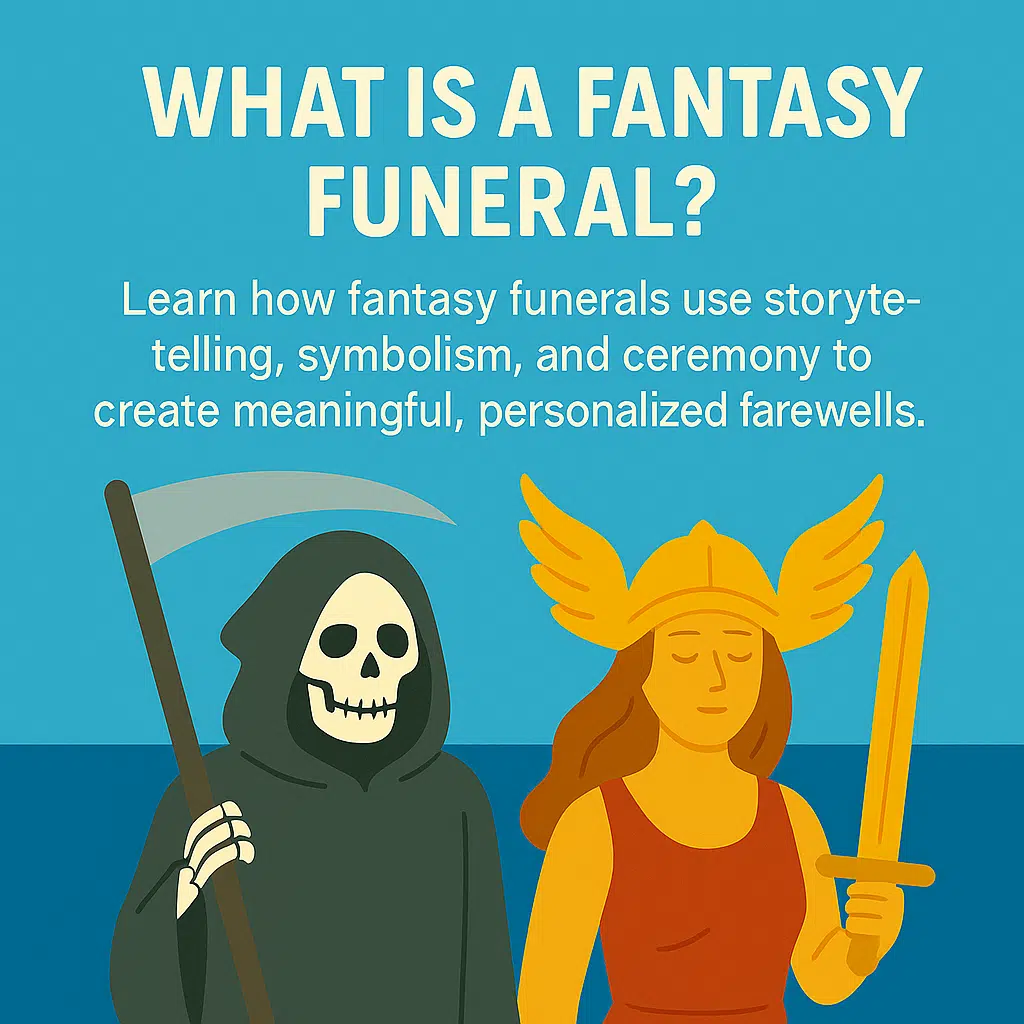Because not everyone wants a black suit and a sad sandwich
The Fantasy Funeral Planner Career Information Hub
Fantasy funeral planners help people say goodbye with imagination, humor, and heart. From themed celebrations of life to custom rituals, Viking farewells, costume-optional memorials, and eco-conscious send-offs, this role is part event designer, part grief guide, and part creative visionary.
Whether you’re working with families pre-need or helping them honor someone who just passed, you help turn stories and personalities into one-of-a-kind goodbyes. If you love meaningful details, care about ritual and experience, and think the end of life deserves just as much creativity as any other major milestone, this career might be your perfect fit.

Key Things To Know
If you're curious about a career in fantasy funeral planning, here are some helpful facts to ground your imagination:
-
This is a real career path, not just a quirky idea: As the funeral industry becomes more personalized, planners are helping families create meaningful and creative ceremonies
-
It blends grief work with event planning: You’ll need the empathy of a counselor and the logistics skills of a wedding planner
-
You don’t need to be part of a funeral home: Many fantasy funeral planners operate independently or partner with celebrants, funeral directors, or venues
-
Ceremonies can be secular, spiritual, traditional, or totally out there: Your role is to help people express love and loss in a way that feels right to them
-
Themes range from simple to extravagant: You might organize a backyard memorial picnic or design a full Viking ship cremation ceremony (yes, really)
-
You’ll need to guide people through emotional terrain: Many clients will be grieving, so compassion, patience, and sensitivity are key
-
You may coordinate with multiple vendors: Musicians, florists, venues, costume designers, eco-burial providers, and caterers could all be part of the mix
-
You’ll often work with tight timelines: When planning post-death, events may need to come together in days rather than weeks
-
Legal knowledge helps: Understanding state laws around body disposition, cremation, green burials, or scattering ashes is useful, even if you're not a licensed funeral director
Why Choose This Career?
If you’re creative, organized, and drawn to meaningful moments, here’s why fantasy funeral planning might be your calling:
-
You help families honor someone’s life their way: Whether they want a simple sunset toast or a cosplay memorial, you make their vision possible
-
No two days are alike: You’ll plan celebrations that reflect cultures, subcultures, religions, fandoms, hobbies, and personalities
-
You bring beauty to grief: Your work helps people celebrate life, even in the midst of loss
-
You make space for laughter and love: Not every goodbye has to be somber. You help people cry, laugh, dance, and remember
-
You help shift cultural norms: This career lets you push back against generic funerals and help people reclaim ritual and meaning
-
You can specialize in a niche: From themed burials to green funerals to pet memorials, you can tailor your offerings
-
It’s emotionally rich work: You’re creating something that families will remember for the rest of their lives
-
You don’t need a license to get started: In most cases, you can build this business without funeral director credentials, especially if you focus on the planning and not the body care
Job Responsibilities
Fantasy funeral planners wear a lot of hats, from designer to project manager to emotional guide. Here’s what the work typically involves behind the scenes.
-
Meet with families or individuals to understand the story, values, and tone they want the event to have
-
Design personalized ceremonies that reflect the deceased’s life, personality, and legacy
-
Source and coordinate vendors such as florists, musicians, caterers, celebrants, and rental companies
-
Secure venues and permits for indoor or outdoor services, including unique locations like beaches, theaters, or hiking trails
-
Oversee the event timeline and logistics to ensure everything runs smoothly
-
Incorporate storytelling, visuals, music, or rituals that are meaningful to the family or community
-
Offer emotional support and communicate clearly and compassionately with grieving clients
-
Coordinate with funeral homes when needed for cremation, burial, or transport details
-
Stay current on trends and laws related to body disposition, funeral customs, and memorial innovations
Education and Certification Requirements
There’s no one-size-fits-all path to becoming a fantasy funeral planner, but here’s what helps:
-
No formal degree required: A background in event planning, hospitality, psychology, ministry, or design can all be helpful
-
Training in grief support or death education is a plus: Certifications like Certified Funeral Celebrant, End-of-Life Doula, or Grief Educator add value
-
Business knowledge matters: If you're starting your own planning service, understanding pricing, contracts, and liability is key
-
Creative portfolio or website helps: Being able to show examples of past events or mock-ups gives potential clients confidence
-
Consider niche training: Workshops in green burial, ritual design, storytelling, or legacy work can strengthen your offerings
-
Strong soft skills are essential: Active listening, emotional intelligence, and adaptability go a long way in this role
-
Stay educated about cultural and religious traditions: The more versatile you are, the more clients you'll be able to support
How To Get Started
If you’re ready to turn this dream career into something real, here are the first steps to help you build skills, confidence, and visibility:
-
Start by volunteering or shadowing: Offer to help a local funeral home, celebrant, or end-of-life doula with event logistics
-
Build a sample portfolio: Design a few themed funeral concepts with visuals and ceremony outlines to showcase your ideas
-
Take workshops in death literacy and event planning: You’ll need both creative and practical skills
-
Attend alternative funeral conferences or death cafes: These are great places to learn, network, and find mentors
-
Practice designing events for real or fictional people: It sharpens your storytelling and planning muscles
-
Create a brand and business plan: Even if you’re not launching yet, this will help you shape your vision and services
-
Partner with local vendors and venues: Build relationships with people who could help bring your events to life
-
Market your offerings: Use social media, blog posts, or talks to share your vision and attract like-minded clients
Common Myths
Fantasy funeral planning may sound unusual to some, but much of the skepticism comes from misunderstanding. Let’s clear up a few things.
"No one would actually hire someone to plan a themed funeral."
Yes they will. Families want to honor someone’s personality and passions, and often don’t know how to do it without help.
"This is disrespectful or silly."
On the contrary, creating a unique and joyful farewell can be one of the most respectful things you can do. Grief doesn't have to be silent or gray.
"You need to be a licensed funeral director."
Not necessarily. As long as you're not handling the body or filing legal paperwork, you can focus entirely on the ceremony and experience.
"It’s only for rich people."
Many creative funerals are modest in cost. A picnic in a park, a karaoke night, or a themed slideshow can be powerful and affordable.
"It’s just party planning with skulls."
It’s more than that. You’re helping people grieve, remember, and reconnect. The logistics may feel familiar, but the emotional weight is much deeper.
"There’s no market for this."
Wrong. Demand for personalized, meaningful send-offs is growing. Families are tired of copy-and-paste funerals and are looking for someone to help them do something different.
What Makes Someone A Good Fit
This work isn’t for everyone. But if these qualities describe you, you might thrive in a role where creativity meets care.
-
You’re creative and imaginative: You love finding unique ways to tell a story or design an experience
-
You’re emotionally grounded: You can be a calm, compassionate presence in intense or uncertain moments
-
You’re detail-oriented: You can juggle timelines, budgets, vendors, and all the moving parts of a live event
-
You’re a great listener: You know how to pick up on what people are really saying, even when they’re grieving
-
You’re flexible: You can adjust when weather changes, emotions run high, or Plan A falls through
-
You love ritual and meaning: Whether it’s a candle lighting or a costume tribute, you understand the importance of symbolic acts
-
You’re not afraid to talk about death: You can meet people where they are, without flinching or minimizing their feelings
-
You want to do work that matters: You’re not just planning an event. You’re creating a memory that will stay with a family forever
Articles
Frequently Asked Questions
Got questions? You’re not the only one. Here are some of the most common things people want to know before stepping into this profession.
Disclaimer: The information provided on this website and by Buried in Work is for general informational purposes only and should not be considered legal advice. Please consult with a qualified attorney or subject matter expert for advice specific to your situation.



